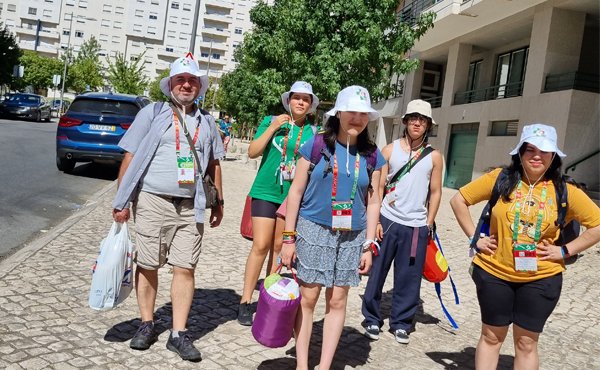I moved to Sweden in June 2006, in the month of nearly 24 hours of daylight a day. Over the years, I have taken on different projects, particularly volunteer work. Those projects are a unique window through which to engage young people, reminding them of the profound importance of human connections and their link to faith. This truth came home to me in a particular way during World Youth Day (WYD) in Lisbon this summer.
In the Angelus after the final Mass of WYD, Pope Francis’s words resonated in my heart, emphasising the importance of acknowledging our roots, being grateful to our grandparents, and remembering the origins that shape our entire identity. They reminded me of advice I received when I moved to Sweden: “Monick, never forget where you come from, cherish your origins, and the joy and faith of your people.” I have come to treasure this counsel like never before.

The Catholic population in Sweden is a small minority, and even Catholic individuals don’t always practise their faith. The Pope’s recognition of grandparents is particularly fitting: I have noticed that immigrant families sometimes leave the faith behind in their search for a better future, and it is only when their grandparents visit that it is rekindled. They want to go to Mass again and begin preparing the little ones for their first Communion.
Conversations with fellow catechists at the Cathedral of Stockholm have revealed how deeply Catholics in this country long for their traditions. It is not only that there aren’t many Catholics here: after the Reformation, Catholicism nearly disappeared from Sweden.
One of the most pleasant surprises I found when I arrived in Sweden was what people are beginning to call the “Latin chapel” in the Cathedral of Stockholm. It houses an image of our Lady of Guadalupe (from Mexico) and another of the Lord of Miracles (from Peru). The procession honouring the image of the Lord of Miracles is one of the most deep-rooted Catholic traditions in Peru, and I was amazed to see the same procession wind through the streets of South Stockholm in October. It is a compelling illustration of how our origins become means of evangelization: many people ask about it, giving me a natural opportunity to share my faith and traditions. Children attend with their grandparents, all dressed in purple, and their natural joy is yet another means of evangelization.
I am profoundly grateful for the lessons I learned as a child, like making the sign of the Cross when passing a church and having an image of our Lady and a crucifix on our walls at home. How could I have known that those habits would prepare me for moving to a country hungry for evangelization in everyday life, without any need for extraordinary feats?
A few weeks ago, a colleague remarked that there was “something good” in me. I was taken aback by this comment, but his follow-up explanation struck a chord: “After the years you've spent in Sweden, it's clear that you haven't stopped believing in God and that you live your faith. It's reflected in the way you work and how you speak.” I was happy to hear it, but his comment also made me feel the challenge to continue evangelising. As I said before, I am thankful for the rich Catholic traditions instilled in me.

Moving to another country always entails the challenge of integration. Those who have experienced it understand that the process of learning a new language, adapting to new customs, and developing a taste for new foods is no easy feat.
I journeyed to Portugal with a group of Spanish-speaking young people, all of whom had been confirmed and chose to participate in WYD. Many of them were the only Catholics in their schools, and they were astounded to meet and talk to countless young Catholics from around the world in Lisbon. They were no longer isolated; they realised how many people share their values and aspirations. When we spotted the flags of their countries of origin (Peru, Chile, Brazil…) on the streets, they would immediately strike up a conversation: “I’m from your country, but now I live in Sweden, and I’m a Catholic there.”
